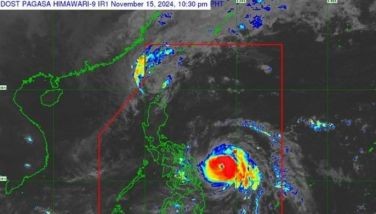Supreme Court: Jai alai can resume, but only if ru
August 25, 2001 | 12:00am
Jai alai will soon be back. But this time, the game of a thousand thrills will be directly supervised by the government.
The Supreme Court changed its mind yesterday and allowed jai alai to resume in the country, but only under the watch of the state-run Philippine Amusement and Gaming Corp. (Pagcor).
In a 10-5 decision, the high tribunal modified its Nov. 19 decision which banned the Basque game. It noted that jai alai operations will only be considered legal if they are done by Pagcor.
The ruling put to rest the claims of private firms Belle Jai Alai Corp. and Filipinas Gaming Entertainment Totalizator Corp. (Filgame) that Pagcor granted them a franchise to run the games.
According to Justice Jose Vitug, who penned the Court’s seven-page decision, Pagcor’s charter — Presidential Decree 1067-A — does not allow the agency to grant gaming franchises to private firms.
"Indeed PD 1067-A which created Pagcor made it crystal clear that it was to implement the policy of the State to centralize and integrate all games of chance," the court said.
Pagcor initially claimed that Presidential Decree 1869 gives it the right to issue franchises to private companies. However, the Supreme Court said the decree only allowed the agency to issue licenses for operations of casinos, not jai alai.
The tribunal noted further that it was surprised that Pagcor never asserted its power to operate jai alai from 1977, the year the agency was created, to 1999, when controversy started to hound the game.
"Twenty-two years is a long stretch of silence. It is inexplicable why it never claimed its alleged franchise for so long a time which could have allowed it to earn billions of pesos as additional income," the Court said.
Jai alai had been very popular among Filipinos for many decades until it was banned by President Corazon Aquino in 1986. It was only revived after Aquino’s term expired but lawmakers protested against the game, claiming only Congress has the power to issue a franchise for its operation.
Nonetheless, the game continued from June 1999 to November 2000, generating some P2.8 billion in revenues. Its operators then – Belle and Filgame – remitted P199 million to Pagcor and P262.5 million to the Bureau of Internal Revenue as taxes.
It is not clear how Pagcor will be able to operate jai alai since it was the private companies which put up the game’s facilities. In its prior pleadings before the Supreme Court, Pagcor projected a gross earning of P3.5 billion for this year if jai alai is allowed to resume.
Pagcor officials were not immediately available for comment.
The Supreme Court changed its mind yesterday and allowed jai alai to resume in the country, but only under the watch of the state-run Philippine Amusement and Gaming Corp. (Pagcor).
In a 10-5 decision, the high tribunal modified its Nov. 19 decision which banned the Basque game. It noted that jai alai operations will only be considered legal if they are done by Pagcor.
The ruling put to rest the claims of private firms Belle Jai Alai Corp. and Filipinas Gaming Entertainment Totalizator Corp. (Filgame) that Pagcor granted them a franchise to run the games.
According to Justice Jose Vitug, who penned the Court’s seven-page decision, Pagcor’s charter — Presidential Decree 1067-A — does not allow the agency to grant gaming franchises to private firms.
"Indeed PD 1067-A which created Pagcor made it crystal clear that it was to implement the policy of the State to centralize and integrate all games of chance," the court said.
Pagcor initially claimed that Presidential Decree 1869 gives it the right to issue franchises to private companies. However, the Supreme Court said the decree only allowed the agency to issue licenses for operations of casinos, not jai alai.
The tribunal noted further that it was surprised that Pagcor never asserted its power to operate jai alai from 1977, the year the agency was created, to 1999, when controversy started to hound the game.
"Twenty-two years is a long stretch of silence. It is inexplicable why it never claimed its alleged franchise for so long a time which could have allowed it to earn billions of pesos as additional income," the Court said.
Jai alai had been very popular among Filipinos for many decades until it was banned by President Corazon Aquino in 1986. It was only revived after Aquino’s term expired but lawmakers protested against the game, claiming only Congress has the power to issue a franchise for its operation.
Nonetheless, the game continued from June 1999 to November 2000, generating some P2.8 billion in revenues. Its operators then – Belle and Filgame – remitted P199 million to Pagcor and P262.5 million to the Bureau of Internal Revenue as taxes.
It is not clear how Pagcor will be able to operate jai alai since it was the private companies which put up the game’s facilities. In its prior pleadings before the Supreme Court, Pagcor projected a gross earning of P3.5 billion for this year if jai alai is allowed to resume.
Pagcor officials were not immediately available for comment.
BrandSpace Articles
<
>
- Latest
- Trending
Trending
Latest

























